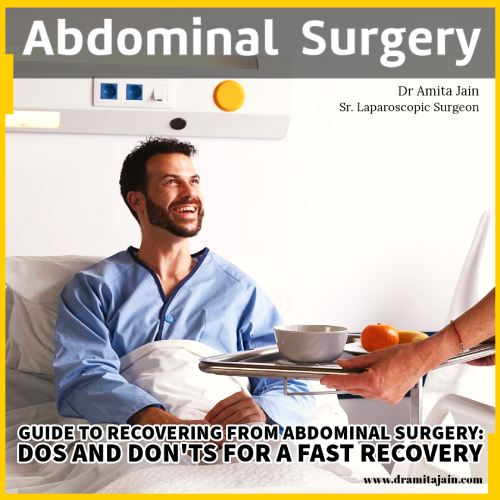Dos and Don’ts for a Fast Recovery
Abdominal surgery refers to any surgical procedure that involves the organs located in the abdominal cavity, which includes the stomach, liver, gallbladder, intestines, appendix, kidneys, and other structures. Whether it’s an appendectomy, hernia surgery, or cholecystectomy, the goal is to address issues like tumors, infections, or injuries.
Preparing for such surgery involves lifestyle changes like quitting smoking, managing blood sugar, and staying active. The surgery can be performed as traditional open surgery or laparoscopy. Regardless of the specific procedure, adhering to certain dos and don’ts can significantly impact the speed and success of your recovery.
Dr Amita Jain who is one of the leading abdomen surgeons in Delhi NCR in the field of laparoscopic surgery shares a few dos and don’ts for faster recovery.

What are the things to Do?
Surgeon Dr Amita Jain says, that for better recovery you need to do the following
1. Listen to your Doctor
Make sure that you adhere to the instructions provided by your healthcare provider. They will provide specific guidelines tailored to your surgery and overall health. These guidelines may cover aspects such as caring for your incision site, the timing of medication intake, and when to gradually resume your usual activities.
2. Ample Rest
Give your body the time it needs to recover. Adequate rest is crucial for the healing process. Aim for at least 8 hours of sleep each night, and consider incorporating short naps into your daily routine whenever feasible.
3. Pain Management
Take prescribed pain medications as directed by your doctor to manage discomfort. This will also help you move around more comfortably, which is important for preventing complications like blood clots.
4. Cleanliness is important
Keeping the incision site clean is extremely important to prevent infections and ensure timely healing. Neglecting proper dressing or hygiene practices, and leaving the dressing unchanged for extended periods, can increase the risk of infection. To mitigate this risk, it is important to regularly cleanse the incision site with mild soap and water as advised by your doctor.
5. Proper Diet
Follow the dietary guidelines prescribed by your doctor. A well-balanced diet consisting of fruits, vegetables, lean proteins, and whole grains will aid in faster healing. Boost protein intake for quicker wound recovery.
Opt for a liquid diet rich in vitamins C and zinc, along with B12 and iron to support bone marrow and blood cell formation. Incorporate fiber and probiotics for immune and digestive health. Stay adequately hydrated for efficient toxin elimination. Diabetics should manage sugar levels to prevent bacterial growth and promote timely healing.
6. Take It Easy
Gradually, resume regular activities under your healthcare provider’s guidance. Listen to your body and avoid pushing yourself too hard. Recovery occurs in stages; initial activities include walking with your nurse and progressing to a cautious return to your exercise routine. Follow your doctor’s instructions for a gradual comeback, acknowledging that complete resumption may take a few months. Prioritize a slow approach to ensure a swift and effective recovery.
What are things you Don’t need to do?
To make sure you have a better recovery, try not to do the following:
1. Say NO to Strenuous Activities
Refrain from engaging in strenuous activities for optimal recovery. Give your body the necessary time to heal, as physical exertion may impede the process. Avoid lifting heavy items like groceries, laundry, children, and pets for at least six weeks post-operation.
Be careful of activities that strain your abdominal muscles, including unexpected tasks like vacuuming. Consult your doctor for personalized guidance on activity restrictions to ensure a speedy recovery.
2. Say NO to Smoking and Drinking
Smoking and excessive alcohol consumption can hamper the healing process. It’s advisable to abstain from these substances during recovery.
3. Follow-up Appointments
Do not forget to attend all scheduled follow-up appointments with your healthcare provider to monitor your progress and address any concerns.
4. Medications
Don’t abruptly stop taking prescribed medication without consulting with your doctor as it can lead to unnecessary complications and delay the recovery process.
5. Diet
Say No to processed food and sugary items and junk food.
What did we learn today?
In order to stay healthy and heal faster, the patient needs to follow certain guidelines, a few of which have been mentioned above, and follow the doctor’s advice.

Dr Amita Jain is a surgeon with highest degree of professional competence, precision and surgical craftsmanship. Performed all complicated general surgery procedures with in depth knowledge of invasive and few minimal invasive and onco surgical techniques. Underwent special training in trauma, executed various trauma-related complex life-saving neurosurgical procedures, reconstructed injured mangled limbs and performed vascular and reconstructive procedures with critical care.
Dr Amita Jain holds 28 plus years of rich experience in Trauma and General Laparoscopic Surgeries (including Gallbladder stone removal, appendix removal, hernia repair surgery, piles and fissure surgeries). She was the Professor Surgery of at the Army College of Medical Sciences and Base Hospital Delhi Cantt. In 1994 she was commissioned as Surgeon under the United Nations Mission in Congo. From 2020 to 2022, she worked with Bansals Hospital. Currently, Dr Amita Jain is the Senior Consultant, (Speciality: General and Laparoscopic Surgeon) at Artemis Lite Hospital, New Delhi
